If you want to protect yourself from phishing and viruses, you will undoubtedly need to rely on URL scanning tools to check a website for malicious infection.
URL scanning is responsible for checking the web link against domain risk history information to see if any suspicious files are being hidden. Even trustworthy websites can have malicious code buried within them that can infiltrate your system and start installing itself.
Some URL scanning tools can also alert you to phishing activity and malware threats. Worried about accidentally giving out your confidential information? It’s important to check the website before you visit it to make sure your information isn’t stolen because phishing can be a bigger threat than viruses and malware infections.
Geekflare has researched, tested and included the best URL scanners to check if a link is safe or not.
- Domain Reputation
- Criminal IP
- URLVoid
- Sucuri SiteCheck
- Norton Safe Web
- Google Transparency Report
- PhishTank
- VirusTotal
- IP Quality score
- ScanURL
- Email Veritas
- Bitdefender Traffic Light
- Show less
Domain Reputation
Domain Reputation tools by WhoisXML API allow users to scan domain names and IP addresses to check if they have been reported as malicious on various malware databases.
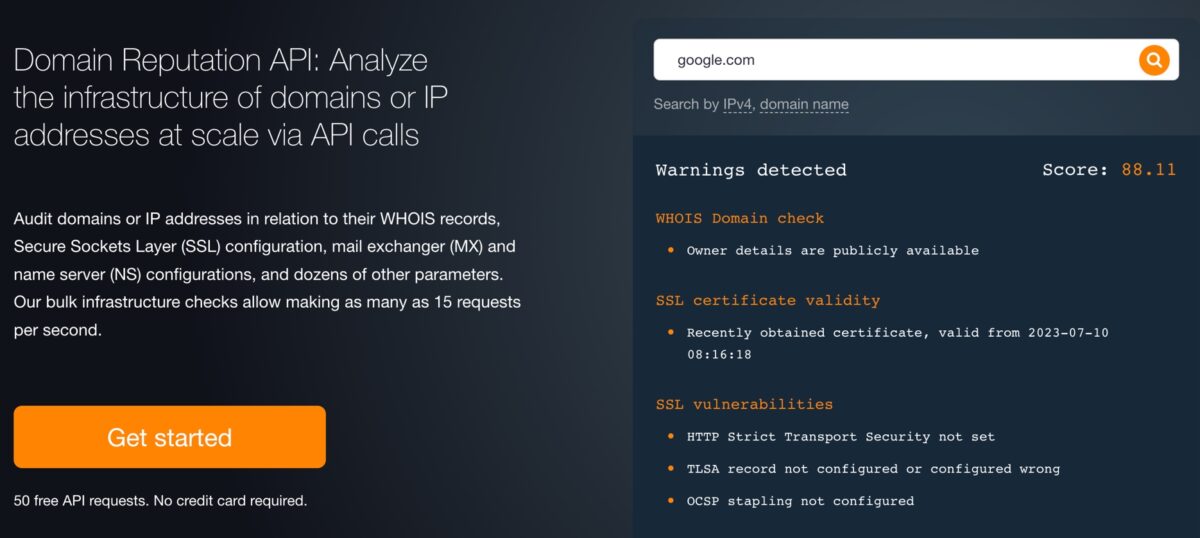
The products also perform several domain infrastructure analyses, including WHOIS Domain Check, SSL Vulnerability Check, MX Record Configuration Analysis, and others, and assign a security infrastructure score. This helps users immediately assess if they are interacting with suspicious or malicious web property.
The tools consider dozens of infrastructure-related parameters crucial to a domain’s or an IP address’s safety and security.
The product line includes a/an:
- API with output queries in JSON and XML. The API allows making as many as 15 requests per second.
- GUI lookup tool that allows users to quickly check a domain name or an IP address and download the results in JSON format.
Check this product sheet to learn how WhoisXML API’s Domain Reputation products can help with your use case.
Sucuri SiteCheck
SiteCheck, a free URL scanner offered by Sucuri, can examine a website URL for embedded malware by inspecting source and configuration files. Sucuri is a well-known security company that provides various services and tools to safeguard websites against malware infection and advanced persistent threats and services to restore compromised sites on the internet.

It also utilizes its proprietary approach that deals exclusively in identifying malicious files in the form of embedded code and shows the precise position of a payload, in contrast to other tools, which use 3rd parties scanning engines. It provides a full range of security monitoring services to diagnose and eradicate malicious programs.
Criminal IP
Criminal IP is a Cyber Threat Intelligence (CTI) search engine with a powerful Domain Search feature to check the safety of URLs.
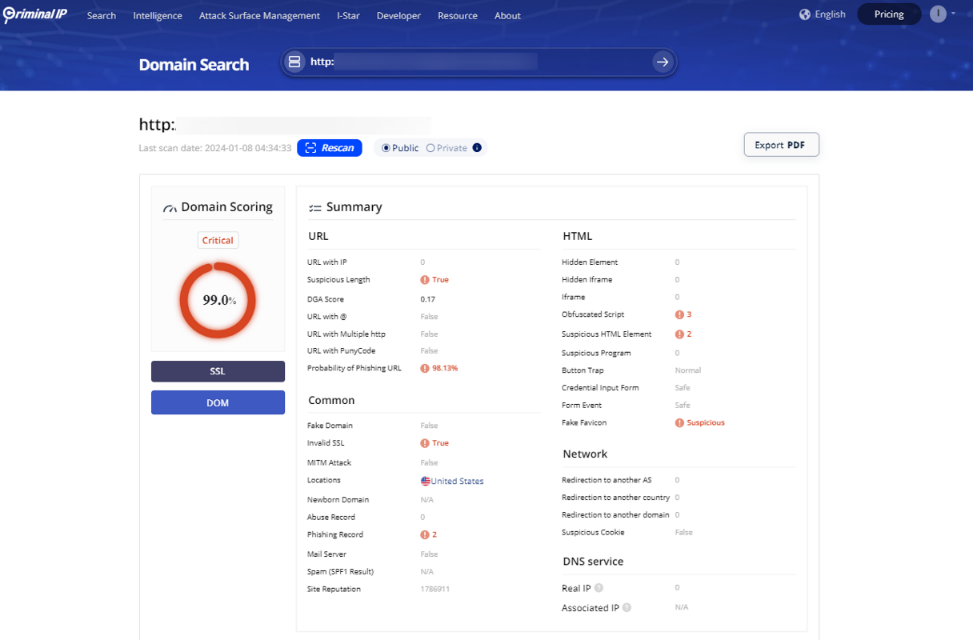
All you need to do is input the domain you want to check, and Criminal IP will determine the website’s safety. Here are some valuable insights from Criminal IP Domain Search Scan Results.
- Domain Scoring: The risk level of a domain (Safe, Low, Moderate, Dangerous, and Critical)
- Newborn Domain: Detection of recently registered domains.
- Phishing Record: information regarding a mapped IP address with a phishing history.
- Suspicious Program: Detection of suspicious executable file available for download.
- Suspicious Length: Detection of domain with suspicious length.
- Suspicious Favicon, Hidden Element, Suspicious Cookie, and many more
This crucial information about a URL will help you make an informed decision whether to visit a website, ensuring a safer online experience. The good news is you can try Criminal IP for free! You can upgrade to one of the various paid plans to unlock additional features anytime.
URLVoid
URLVoid is one of the best and most powerful online tools for URL scanning. It scans a website using more than 30 blocklist engines and web assessment utilities, making finding malicious and deceptive URLs easier. Enter the URL in the space provided and click on “Scan Website” to check for malicious code.
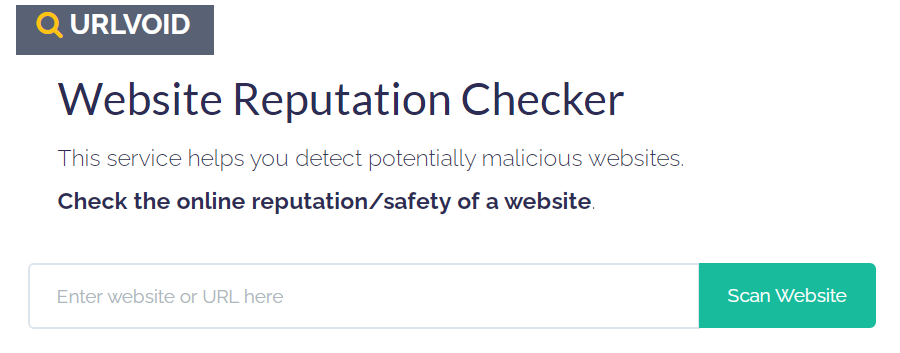
For developers, URLVoid also provides a URL reputation API. You can quickly identify potentially dangerous and fraudulent URLs using this Reputation API. This API uses inbuilt and pre-programmed standards to find possibly harmful URLs.
Many cybersecurity companies are using it to expedite the examination of cyber threats, making it easier to spot possibly hazardous sites and URLs that have been flagged as threats by several reliable sources.
Norton Safe Web
Norton Safe Web is a powerful reputation service provided for URL scanning to check for embedded malicious code and infected files. Paste the URL or site address into the input field, then hit the search button to have it checked for malware.
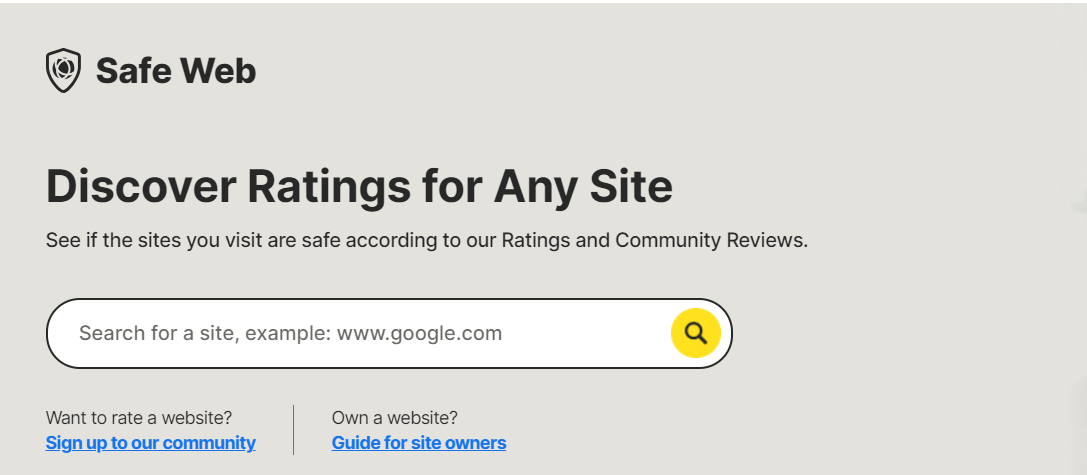
It is an easy-to-use tool that provides immediate and effective results. It helps block suspicious URLs included in emails or even gather in-depth threat intelligence data about a URL.
Google Transparency Report
Google Transparency Report is one of the outstanding and most reliable URL scanning services for finding embedded malicious infections. Enter the URL you want to check and click enter to continue. Google Safe Browsing technology instantly warns the website owner through the search console if any dangerous websites are identified.

Google automatically displays cautionary messages in web browsers and on Google Search when anyone tries to access it. It employs its proprietary technology for identifying malware, unlike other well-known URL checking tools that scan from other providers.
PhishTank
PhishTank is a global community repository for research information about online phishing. PhishTank enables the user to determine whether a link is secure or not, rather than searching for any malicious infections.
This website maintains a significant record of internet sites that engage in phishing activity, allowing you to check for suspectable links and determine which sites are secure to view.

PhishTank offers an open API for programmers and academic researchers to incorporate anti-phishing information into existing solutions. The website allows everyone to validate links that other visitors previously submitted.
VirusTotal
VirusTotal uses an aggregated and comprehensive data methodology to detect harmful and malicious URLs. Simply input the target web URL in the input field and click Enter to conduct a website scan.
It provides both public and private API Services for programmers. These APIs can be used to develop a customized URL checker tool on your website. However, they are only permitted for non-commercial purposes.
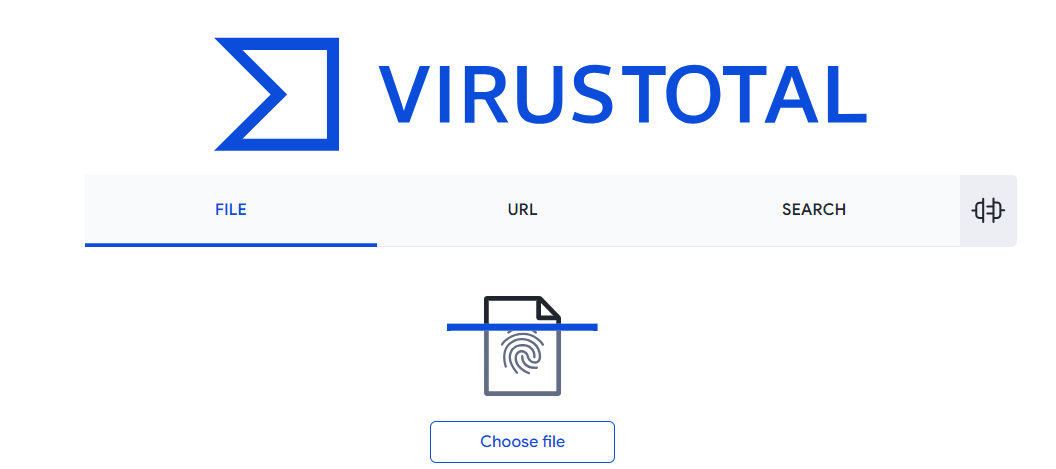
This tool can examine the file hashes, IP addresses, and URLs. It detects harmful links and websites by cross-referencing all the most recent virus scan results of URL scanning providers with over 60 other services. And finally, the test results can be instantly shared with the security community for future reference.
IP Quality score
IPQS malicious URL scanner is one of the most highly recommended URL checker tools to scan for malware infections and Phishing Links. Enter a URL and click Enter to start the scan. It uses a blacklist registry library and deep learning algorithms to examine the target URL.

Users can perform a phishing inspection using the available recent threat info and live-data analysis and also can conduct parked domain detection to find fake websites that are frequently utilized for spamming.
Additionally, it shows other helpful information like risk score, status code, content type, and web server name.
ScanURL
ScanURL is another autonomous web service that accepts URL query input through a secure and encrypted HTTPS linkage to scan for phishing and malicious file infections. It uses reputable 3rd party web services to scan the URLs and websites.
This URL scanner has an easy-to-use interface and provides basic “how-to” guidelines for identifying harmful links. Also, you can share test results with other members using a sharable link.
Email Veritas
Email Veritas provides an accessible and reliable URL scanner tool to scan any URL or website on the internet. Simply enter the target address and click the “Search” button to continue.

It immediately scans and provides a detailed assessment report on potential threats and other helpful details like HTTP status code and redirection chain.
Bitdefender Traffic Light
Bitdefender Traffic Light has state-of-the-art browser protection features that make it an ideal choice for commercial and residential use.
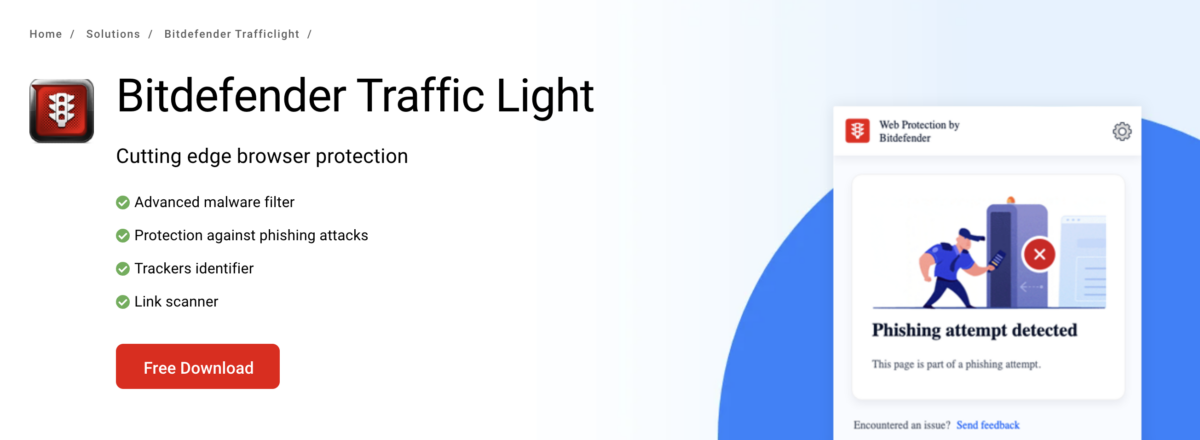
Phishing websites are on the rise, and it is essential to be careful when browsing the internet. However, there is no sure-shot way to determine the credibility of a website. That is why you need a URL scanner to check the legitimacy of the site you are clicking on. Bitdefender keeps you from visiting risky websites by scanning them for malicious activity.
It offers other cybersecurity solutions besides web protection, like spam filters, parental control, and more. However, if you are just looking for a tool that gives you browser protection, you should definitely give Bitdefender Traffic Light a go.
Once you add it to your browser, it will intercept and block all suspicious websites and protect you against phishing attacks, enhancing your browsing experience.
| ✅ Pros | ❌ Cons |
|---|---|
| Filters all harmful content. | Always refreshes and reloads the page, which is time consuming. |
| Intercepts web traffic. | |
| Scans all links for complete web security. |
Bitdefender Traffic Light is a free tool. You can download it from the official BitDefender website under “Solutions” in the drop-down menu.
Conclusion
Gaining admin privileges to infect webpages with malicious code and implant exploits is an increasing motive for hackers. This methodology allows the malware to be distributed over a wide range of systems without using the typical computing resources needed by attackers.
The challenge of identifying harmful links and preventing damage to you systems never ends. Encourage better browsing habits and follow internet safety rules before clicking suspicious links to avoid getting infected with malware.

